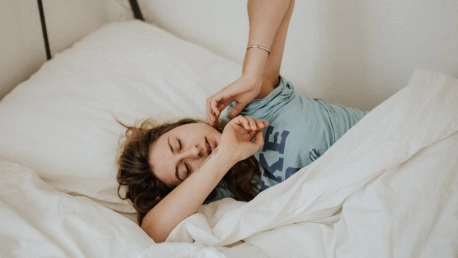A constant need for more sleep can be a sign that something is wrong. But it can also signify a myriad of other things.
Most adults can get by with seven or eight hours of sleep per night, according to Ronald Chervin, director of the Sleep Disorders Center at the University of Michigan. But some people need more than eight hours in order to function properly. Ever asked yourself why?
Below we explore the top reasons behind staying in bed until midday.
Genetics
Contrary to popular belief, the need for some extra shuteye is not linked to laziness –– it’s rooted in your DNA.
“Some are just predisposed to require more sleep. There’s not much we can do individually about our genetics,” Chervin says. “But we can do things about other factors that control how much we sleep, like regularity of bedtime and rise time.”
Sleep Disorders
Albeit common, chronic insomnia is a serious condition that can increase your risk of depression and high blood pressure.
According to the American Academy of Sleep Medicine, 30 to 35 percent of adults experience brief symptoms of insomnia during their lifetime, while 10 percent are afflicted by a chronic insomnia disorder, which occurs at least three times per week and can impact a person’s life for periods stretching as long as three months.
Symptoms include fatigue, inability to focus on tasks, poor memory, mood elevators, daytime sleepiness, and low motivation or energy.
Physiologist and sleep therapist Dr. Nerina Ramlakhan reveals that there are two ways chronic insomnia can affect adults: “Having problems getting to sleep, having problems staying asleep––those are the two most common sleep problems”.
“Then there are issues around restorative sleep or poor quality sleep,” she says. “And all of those things will predispose an individual to need more sleep, as well as things like parasomnias like night terrors. My approach is to get people off medication and help them identify proactive things they can do to get better sleep.”
Mental Health Problems
While sleeping too much can indicate an illness, hypersomnia (oversleeping) can also be caused by mental disorders. It’s the age-old chicken and egg debate––hard to say which came first.
Either way, if you are struggling with your mental health, you are more likely to experience sleep-related issues.
“When people aren’t happy, for example getting up in the morning to go to a job they hate, they are more likely to feel more tired and need more sleep,” Dr. Nerina Ramlakhan explains.
Depression is a common culprit behind excessive sleepiness. Studies show that “sleep disturbance is one of the key symptoms of the disease”. In fact, hypersomnia affects four in ten young depressed adults, “and 10 percent of older patients, with a preponderance in females”. Not only that, but non-depressed young adults who suffer from insomnia are at risk for later development of depression.
“Hypersomnia, or oversleeping, in itself can cause depression because you wake up feeling more tired, lacking in motivation and purpose, which then makes you feel more depressed and more tired. It is a vicious cycle.”
Medical Conditions
Mens sana in corpore sano, as the Latin saying goes, a.k.a your physical and mental health are inextricably connected. Which means, that just as your mental state impacts your sleeping patterns, so does your physical condition.
“Recently I hurt my back playing sport and it was a useful opportunity for me to remember how awful it feels when you don’t sleep because of pain,” Dr. Nerina says.
“So many people suffer from back problems and I think this is one of the things that is really affecting our sleep.”
Other conditions that can impact your sleeping patterns are anemia, pain conditions like fibromyalgia and arthritis, conditions that affect your hormones, and chronic fatigue of course.
Hypersensitivity
You don’t have to be an introvert to be a highly sensitive person. High sensitivity can be defined as “acute physical, mental, and emotional responses to external (social, environmental) or internal (intra-personal) stimuli”.
Highly sensitive people are prone to headaches, eating and/or sleeping disorders, and often experience tension and anxiety in their everyday lives.
“When your nervous system is a state of constant alert, your brain will feel fried by the end of the day. Sometimes, it occurs even at the beginning of the day”, according to Psychologist Dr. Karin Monster-Peters.
“It is no surprise that being highly sensitive increases your chances of experiencing burn out at least once during your lifetime. And sleep helps decompress and revitalize your nervous system. This is not a luxury item on a ‘one day I will’ list. This is a necessity.”









